Francispeak At Work: Jesus’ Miracle Of The Fish And Loaves.
The Year of The Lord 2014 is very young, and Pope Diana has already found a way to confuse and scandalise Catholics in that typical sly, slimy, Modernist, Jesuitical way of his. This time, the attack is directed at that miracle of Jesus called the “multiplication of the Fish and Loaves”.
For you Jesuit Popes out there: multiplication of loaves of bread, or of fishes, means that through a miracle of Jesus, the bread loaves and the fishes have been multiplied. So much so, in fact, that in the end there was enough to feed thousands, and to spare.
It doesn’t seem very complicated to me: there is a multiplication, and this multiplication is a miracle. You can’t do that. Jesus can. Anytime. Why do you believe that Jesus can multiply breads? Because you believe that Jesus is God. Why do you believe this particular miracle? Because it is in the Gospel.
But what if you, say, do not believe that Jesus is God? Then you will not believe that he can make miracles, at least not of his own. Similarly, when you doubt the miracle but you happen to be, say, Pope, you must say things in a way that show you don’t really see the miracle as a miracle, whilst avoiding the statement that there was no miracle.
How do you do that? With Francispeak.
As I have already explained, Francis rather likes Francispeak. It allows him to make the world understand he is on their side, without being openly the enemy of Christ. Ambiguity and duplicity are more than sufficient for the army of Satan to do their work, whilst the many Christian Pollyannas will simply refuse to see that something is seriously wrong. With this Pope, an awful lot is seriously wrong.
So let us see the way Francispeak works. He is speaking of the miracle of the multiplication of the breads and fishes last June. His words are as follows (emphasis mine):
Jesus trusts in the heavenly Father without reserve; he knows that for him everything is possible. Thus he tells his disciples to have the people sit down in groups of 50 — this is not merely coincidental, for it means that they are no longer a crowd but become communities nourished by God’s bread. Jesus then takes those loaves and fish, looks up to heaven, recites the blessing — the reference to the Eucharist is clear — and breaks them and gives them to the disciples who distribute them… and the loaves and fish do not run out, they do not run out! This is the miracle: rather than a multiplication it is a sharing, inspired by faith and prayer. Everyone eats and some is left over: it is the sign of Jesus, the Bread of God for humanity.
These astonishing words are very similar in their implied meaning to what we read here; an interpretation too unorthodox even for “Catholic Answers”.
Notice this: he never says explicitly that a miracle – as in: the miracle of multiplying food, so that thousands instead of a dozen or two might be fed – has not taken place. But then he inserts a Francispeak expression, in which he redefines the word “miracle”: not the multiplication is a miracle, but this fluffy, utter V II concept of “the sharing”. For Francis, the miracle consists in the sharing. Mind, the miracle is still called a “miracle” so that the Pollyannas may swallow it whole, but it is also called a “sharing” so that everyone with a brain knows what Francis really thinks.
Did the people eat “sharing”? No. They ate bread and fish. Why did they ate it? Because Jesus multiplied it. The miracle consists, as every child who has never heard of Jesuits will tell you, in the multiplication of breads and fishes, full stop.
But now imagine our intrepid Pontiff at dinner with his buddy, Rabbi Skorka. The Rabbi cannot admit that Jesus multiplied the fishes and the breads, because he perfectly well knows that this means to admit that Jesus is God. At this point, the dinner becomes a tad, ahem, “divisive”. Francis cannot admit that, of course. If Jesus is allowed to put Himself between him and his buddy something must be wrong, ah, eh, no? What would, then, a Jesuit do? Twist the words, to the point that the white becomes black, the opposites are reconciled, and the reality of the miracle is not openly denied, but transformed to the point that even Rabbi Skorka cannot have any problem with it.
An expression like “the sharing is the miracle” means perfectly nothing from a theological point of view. You can say that friendship is “a miracle”; or love; or a beautiful sunset; or a fluffy little kitten; or pretty much everything you want to link with a positive idea of innocent wonderment, and achievement of good hearts. Alternatively, you can mean – like the priest cited by “Catholic answers” – that Jesus teaches generosity and “sharing” as an act of giving: it appears there isn’t enough to eat, but in fact there is, once the “have” have been taught to share with the “have not”.
Rabbi Skorka can certainly live with this “miracle of sharing”, without any problem. Every Hindu could; every Muslim; even every Atheist! What has gone lost in the meantime is what has really happened, and the consequences of the event: that Jesus can multiply breads and fishes, and he can do it because he is God.
Francispeak is here in action with another bending over forward: it says and it denies, it allow to accept and to refuse, it is edible for Christians Pollyannas (not the orthodox ones) and for assorted infidels.
“Ah”, the Pollyannas will say: “he said that, but he did not mean it! Whenever the Pope says something wrong, we must understand that he has said something right! It must have been a mistake, surely?”
Yeah, right. Unless Francis does it again, stating just a couple of days ago that the miracle is a “parable” and causing poor Jimmy Akin to break in a very sweaty exercise in mental gymnastics, at the end of which he can’t find anything better than to say he must have meant “miracle” instead of “parable”.
If Francis is completed demented, yes, I agree. Otherwise, I am afraid when he said “parable” he meant “parable”, because that’s just what he said. If Francis doesn’t know the difference between a parable and a miracle he has no business being a priest, much less a bishop, least of all the Pope.
Now, the first two or three times you might say Francis has been “unguarded”; but heavens, this man strays from basic Catholicism day in and day out! How long does it take to understand that he is just does not care for Catholicism? Nor should you be deceived from the fact that on other occasions, Francis might have referred to the miracle as “miracle”. Firstly, you have seen in the phrase mentioned above that for a Modernist words mean nothing else than what he wants them to mean (the “miracle” is, in fact, a “sharing”; but he still calls it a “miracle”); secondly, it is typical of the Modernist strategy to confuse truth with lie, speaking sometimes truth and sometimes heresy, as brilliantly stated in Auctorem Fidei:
“mixing at times one with the other in such a way that he was also able to confess those things which were denied while at the same time possessing a basis for denying those very sentences which he confessed”.
Jorge Bergoglio has created his own bespoke religion, probably for some decades now; this religion of his allows him to do and think whatever he pleases, and exempts him from being Catholic in every recognisable meaning of the word. Now that he has been made Pope, he proceeds to spread the word of this religion of his, of which he is so fond.
Beware of the wolves speaking of “parables”.
Mundabor
Posted on January 5, 2014, in Catholicism, Conservative Catholicism, Traditional Catholicism and tagged francispeak, Miracle of loaves and fishes, Pope Francis. Bookmark the permalink. 29 Comments.






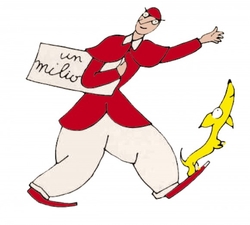

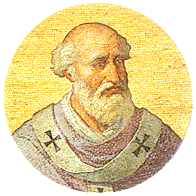
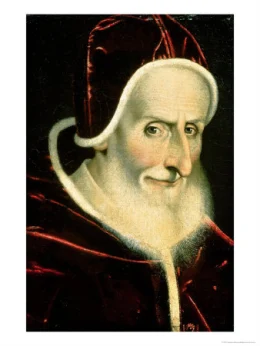
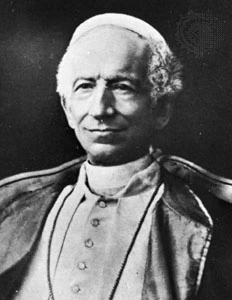







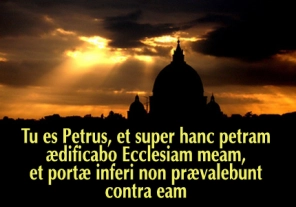


I’m afraid you are right. A sermon like this weakens the faith. It does so subtly, because the words are vague and ambiguous, so listeners don’t have the chance to put up their defenses . Actually, I don’t care for Pope Francis’ often cited “I am a son of the church”: In his mouth, it doesn’t sound like someone expressing his love to the church and her teachings, but rather as if he is objectifying and distancing himself: “Yes, I have an obnoxious, senile and prejudiced father, but what am I to do? He’s still my father. Family ties. You know…” But hey, the pope isn’t really that important. Jesus, the Church and the community of saints, that’s the bedrock. We’ve had bad Popes before. I think a relaxed attitude is better. Otherwise, people might get the pope is more important than he actually is
I fully agree.
He is the Pope, what should he say: “I am not a son of the Church?”. And yes, he seems to apologise for that. In the same vein, many of his off-the-cuff homilies are clearly meant to bend Christianity, or Catholicism, to please other people, be they Jews or Atheists or whatever else.
I remember those “modern” priests in the Eighties, full of shame for being Catholic priests and so desirous of being “one of us”.
He is that, on steroids.
M
« … once the “have” have been taught to share with the “have not”. » (your 14th paragraphe)
This is like « to take from those who possess and to give it to the depossessed ».
It’s pure marxism, or Liberation Theology, which is the same.
The Bishop of Rome is sabotaging the Catholic dogmas, one by one. Look at his sermon of December 20, 2013, in St Martha’s House, where he stated (speaking of the Blessed Virgin thinking of God) : « … And perhaps she even had the desire to say: ‘Lies! I was deceived!’ » (Your post of December 31, « The Alternative Blessed Virgin ».)
This pope is not gaga, he is not waffling ; or, more exactely, his waffling is a strategy. He has a plan. The plan to destroy dogmas. He waffles in order to « drown the fish », as we say in France.
Rhizotomos
Christus vincit, Christus regnat, Christus imperat !
I think he is a prime case of hearing, but not understanding, what he was taught during his formation. He seems to snatch up bits and pieces at random, like a child trying to ram the wrong pieces into the jigsaw puzzle.
The Pope’s sermon about the multiplication of the fishes handles that miracle in a way that appears very similar to the way the head of the CDF, Archbishop Muller treats the miracle of the Virgin birth and the Real Presence in the Eucharist in his books .I wonder if there was some input from Muller on the Pope’s recent miracle of the fishes sermon.
Yes, I agree.
Whilst Mueller was, in my opinion, subtler, the Modernist thinking is the same: it is, but it also isn’t, because you see, you don’t have to look at it as they told you all this time…
M
Mueller said that a camera would not have recorded the Resurrection. That does not seem subtle to me at all. He says (without saying) that the Resurrection was an hysterical group hallucination.
Either that, or he is saying that Our Lord is a Vampire.
Apologies, I was confusing with another blunder of his.
M
I think it’s fine to criticise Pope Francis for all his scandalous ways and errors, but I don’t think it helps (both for your own spirituality and you readers) to call him derogatory names like Pope “Diana”.
I think Pope Diana is very gentle.
if you follow this blog, you will read many others.
Note I am so gentle merely because he is Pope; it’s not a gentleness he has deserved.
M
I was taught the Miracles of Jesus were both miraculous events and also parables pointing to His Divinity and mission. Isn’t this what Jesus said in His very first public declaration that He was the long awaited Messiah?
Then, as now, some want to silence Him. Then, as now, they will not be able to.
A parable is different from a miracle. A parable is a didactic story that is there to make a point. A miracle is an historical event. Whilst Jesus’ miracle all (obviously) teach something, they are not parables. They really happened.
M
I agree.
My point, which I expressed badly, was that Jesus’ miracles were, of course, all historical events, they all had a meaning and a point beyond the historical event.
Ah, yes, certainly.
M
It is very discouraging hearing this errors from high places. I recall hearing this – garbage- back in the 1990’s, along with similar attacks on our Lady… This is all that on steroids, as you say. I wanted to thank you again for the reality check. It has been one shock after another since last year.
It is not likely this is going to get better any time soon. Since I am grateful to see it for what it is, I do not wish to check out intellectually just because it looks like it is across the board. What are we to do now? Continue to study what the Church has always held and taught, pray for grace of perseverance, and clarity. Pray the rosary along with the Crusade for those intentions.
The problem with His Holiness asserting that the miracle of the multiplication of the fish and the bread is merely a “parable” is that it’s rather selective. What constitutes as a miracle and what does not? Does Christ turning water into wine constitute as a “parable”? What about the Eucharist? Is that only a “parable” on the value of communion turning the notion Protestant? It’s problematic because it causes scandal, and it’s problematic because it fosters questions as to what His Holiness accepts as “parable” and miracle.
As to the latest issue regarding His Holiness Pope Francis, well Rorate Caeli has some news:
‘”My mother’s [female] fiancée doesn’t like me,” said the little girl. Pope’s answer: “don’t vaccinate them against the Faith” [UPDATED]’
Summary? Shut-up and don’t preach the issues. You have a lot of work ahead of you Mundabor, God be with you.
A miracle is a historical fact of the Gospel. It really happened, and Jesus made it happen. A parable is something that Jesus said with reference to an abstract situation, in order to teach a point. Jesus did change the water in wine. That was a miracle, not a parable.
M
*sigh* Francis. The miracle of the “sharing”. Who exactly is “sharing”? God? Or the people there? If there is no food, how can they share anything? They are given food not sharing what they have. Is that what we call the fruit that grows on trees? God “sharing” with us? Where is the natural order and identification of things? Me thinks that Pope Francis needs to arrange his thoughts according the to the philosophical principle of non-contradiction. His words are vague, emo and infer that Christ did not commit a miracle. Very sly indeed. God bless~
Very well said.
M
‘Jesus did change the water in wine. That was a miracle, not a parable.’
I fear that my argument was not clear, yes Christ changed the water into wine, yes it was a miracle. I argue on the basis of how do you know His Holiness Pope Francis does not think so, where does His Holiness Pope Francis stop at the selection.
By saying “the miracle is in the sharing”.
If it’s sharing, it’s not a miracle. if I share my bread with you, it’s not a miracle.
Of course, he says it in the modernist way. See blog post.
M
To Christopher, Maccuscuria & may be some other readers
Have you clicked on the link in Mundabor’s text leading to « Catholic Answers » ? There is a very long, and very well developed text about the « miracles » (I always read the links, thanks for them, Mundabor) :
http://www.catholic.com/magazine/articles/loaves-and-fishes
Rhizotomos
Christus vincit, Christus regnat, Christus imperat !
Mundabor, I fear I am terrible at being clear, Mea Culpa.
The basic argument being placed is what else does the Pope question?
You mean in my blog post of yesterday or in his speech?
The man talks so much I tend to isolate and comment only on one blunder (or very few ones) at a time, so it’s difficult at time to remember what else he said on the same day.
M
6 th January, Day of The Magi
You may have noticed that I very much like the Magi (the « Holy Three Kings » in Germany, my original country).
Today, I came across two blogs about this subject which I would like to ‘share’ with you (the ‘sharing’ being the great thing of the moment, in contest with ‘slyness’).
First :
http://lesalonbeige.blogs.com/my_weblog/
which states : « The Epiphany is a feast of Christus-Rex ».
which leads to the second link :
http://www.hommenouveau.fr/878/religion/ephiphanie—une-fete-du-christ-roi.htm
There is the whole article, which seems a little simple at the beginning. But it’s becoming more subtle when reading. I say ‘subtle’, not ‘sly’.
Rhizotomos
Christus vincit, Christus regnat, Christus imperat !
I have published this, but I wonder what help it is the publishing of long articles in a foreign language. French blogs would, methinks, appreciate these links more.
M
You have an international audience (look at your statistics) and most of them well educated (if one can judge by their style), so many of them may have learned French (or German, or Italian, or Spanish) in earlier times.
If these texts are too long, can you not eliminate them and just leave the links?
Rhizotomos
Christus vincit, Christus regnat, Christus imperat!
The text wasn’t long, but I see the statistics and the french readers are a tiny group, even the Germans or Italians are (the French are even less).
A link like this reaches perhaps 3% of the readers.
M
Some of us read the French and the Spanish links even though we are ‘Amerkans’ ( thanks to my few university classes that were at all helpful—no Italian, sorry, but it’s fairly readable anyway…). 🙂 I really like Le Salon Beige and I know several others who read it.